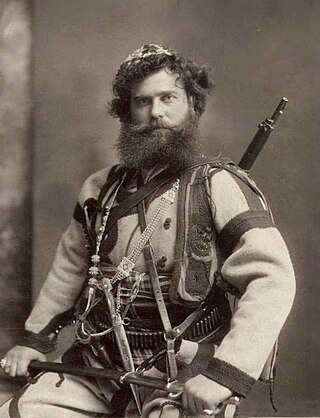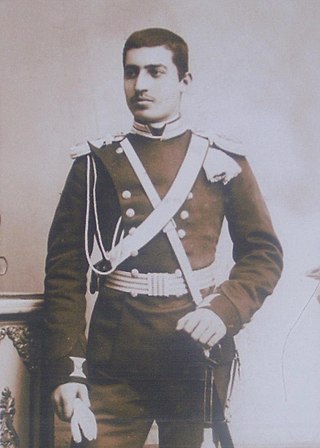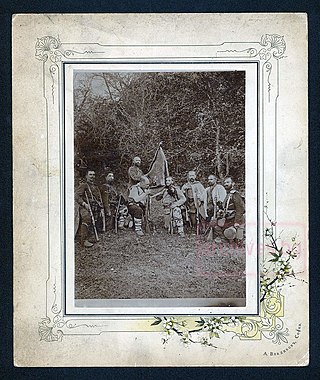
The Internal Macedonian Revolutionary Organization, was a secret revolutionary society founded in the Ottoman territories in Europe, that operated in the late 19th and early 20th centuries.

The Ilinden–Preobrazhenie Uprising, or simply the Ilinden Uprising of August–October 1903, was organized revolt against the Ottoman Empire, which was prepared and carried out by the Internal Macedonian-Adrianople Revolutionary Organization, with the support of the Supreme Macedonian-Adrianople Committee, which included mostly Bulgarian military personnel. The name of the uprising refers to Ilinden, a name for Elijah's day, and to Preobrazhenie which means Transfiguration. Some historians describe the rebellion in the Serres revolutionary district as a separate uprising, calling it the Krastovden Uprising, because on September 14 the revolutionaries there also rebelled. The revolt lasted from the beginning of August to the end of October and covered a vast territory from the western Black Sea coast in the east to the shores of Lake Ohrid in the west.

Georgi Nikolov Delchev, known as Gotse Delchev or Goce Delčev, was an important Macedonian Bulgarian revolutionary (komitadji), active in the Ottoman-ruled Macedonia and Adrianople regions at the turn of the 20th century. He was the most prominent leader of what is known today as the Internal Macedonian Revolutionary Organization (IMRO), a secret revolutionary society that was active in Ottoman territories in the Balkans at the end of the 19th and the beginning of the 20th century. Delchev was its representative in Sofia, the capital of the Principality of Bulgaria. As such, he was also elected a member of the Supreme Macedonian-Adrianople Committee (SMAC), participating in the work of its governing body. He was killed in a battle with an Ottoman unit on the eve of the Ilinden-Preobrazhenie uprising.

The Macedonian Struggle was a series of social, political, cultural and military conflicts that were mainly fought between Greek and Bulgarian subjects who lived in Ottoman Macedonia between 1893 and 1912. The conflict was part of a wider rebel war in which revolutionary organizations of Greeks, Bulgarians and Serbs all fought over Macedonia. Gradually the Greek and Bulgarian bands gained the upper hand. Though the conflict was largely pacified by the Young Turk Revolution, it remained a low intensity insurgency until the Balkan Wars.

Damyan Yovanov Gruev was а Bulgarian teacher, revolutionary and insurgent leader in the Ottoman regions of Macedonia and Thrace. He was one of the six founders of the Internal Macedonian Revolutionary Organization. Per the Macedonian historiography, he was an ethnic Macedonian. He's considered a national hero in Bulgaria and North Macedonia.

Hristo Tatarchev was a Macedonian Bulgarian doctor, revolutionary and one of the founders of the IMARO. Tatarchev authored several political journalistic works between the First and Second World War. He is considered an ethnic Macedonian in North Macedonia.

Tane Nikolov was a Bulgarian revolutionary and member of the revolutionary movement in Macedonia, Thrace and Pomoravlje. He was among the leading members of the Secret Macedonian-Adrianople Revolutionary Organization, Internal Western Outland Revolutionary Organisation and the leader of the Internal Thracian Revolutionary Organisation. Nikolov was also participant in the wars for National unification of Bulgaria.

Ivan Garvanov was a Bulgarian revolutionary and leader of the revolutionary movement in Ottoman Macedonia and Southern Thrace.

Boris Petrov Sarafov was a Bulgarian Army officer and revolutionary, one of the leaders of Supreme Macedonian-Adrianople Committee (SMAC) and Internal Macedonian Revolutionary Organization (IMRO). He is considered an ethnic Macedonian in North Macedonia, having identified occasionally as a Macedonian in his life.

Alexandar Protogerov was a Bulgarian general, politician and revolutionary, as well as a member of the revolutionary movement in Macedonia, Thrace and Pomoravlje. Protogerov was a Bulgarian Freemason and held a leading position in the lodge where he was a member.

Nikola Koev Nikolov, known as Mamin Kolyu was a Bulgarian revolutionary of the Internal Macedonian-Adrianopolitan Revolutionary Organization (IMARO) who fought for the liberation of Macedonia and Thrace from Ottoman rule.

Supreme Macedonian-Adrianople Committee (SMAC),, also known as Supreme Macedonian Committee was a Bulgarian paramilitary and political organization, active in Bulgaria as well as in Macedonia and Thrace regions of the Ottoman Empire. It was based in Bulgaria from 1895 to 1905. Macedonian Bulgarian and Thracian Bulgarian emigrants in Bulgaria were a great number. Led by Trayko Kitanchev, they formed in 1895 the “Macedonian-Adrianople Organization”, at the head of which was “Supreme Macedonian-Adrianople Revolutionary Committee”. Its official declaration was also a struggle for autonomy of Macedonia and Thrace. At the same time, being impatient for the liberty to come sooner, and strongly convinced that it would come only with the help of the Bulgarian Army. Later they directed their efforts in activities for involving the country into war with the Ottoman Empire as for example during the Supreme Macedonian Committee chetas' action in 1895, and the Gorna Dzhumaya Uprising in 1902. As a rule most of the leaders were with stronger connections with the governments. At the end their main idea was, waging struggle for a direct unification with Bulgaria.

Petar Georgiev Darvingov was a Bulgarian officer, revolutionary and military historian, corresponding member of Bulgarian Academy of Sciences from 1932.

Ivan Apostolov, known as Ivan Daskala, was a Bulgarian haydut and revolutionary, a member of the Internal Macedonian-Adrianople Revolutionary Organization (IMARO).

Hristo Apostolov Matov was a prominent Macedonian Bulgarian revolutionary, philologist, folklorist and publicist and one of the leaders of the Bulgarian Macedonian-Adrianople Revolutionary Committees,.

Boris Leonidovich Tageev was a Russian Orientalist, explorer, and writer.

Rafael Moshe Kamhi was a Sephardic Jew from Monastir in Ottoman Macedonia. Besides being Jewish, Kamhi felt also strong attachment to Macedonia as his native homeland. Kamhi was elected as liaison officer of the Internal Macedonian Revolutionary Organization (VMRO). He directly participated in the Miss Stone Affair and in the Ilinden–Preobrazhenie Uprising of August 1903.

Krsta Kovačević, known as Krsta Trgoviški, was a Serbian Chetnik commander that was active in Old Serbia and Macedonia during the Macedonian Struggle (1903–08), then participated in the Balkan Wars (1912–13) and World War I (1914–18). In Bulgaria he is considered a Bulgarian renegade who switched sides, i.e. (sic) Serboman.

The Gorna Dzhumaya Uprising was an anti-Ottoman rebellion that broke out and spread throughout the Pirin region of Ottoman Macedonia in 1902.

Naum Hristov Tomalevski was a Bulgarian revolutionary, participant in the Macedonian revolutionary movement, member of the Internal Macedonian Revolutionary Organization (IMRO).




















